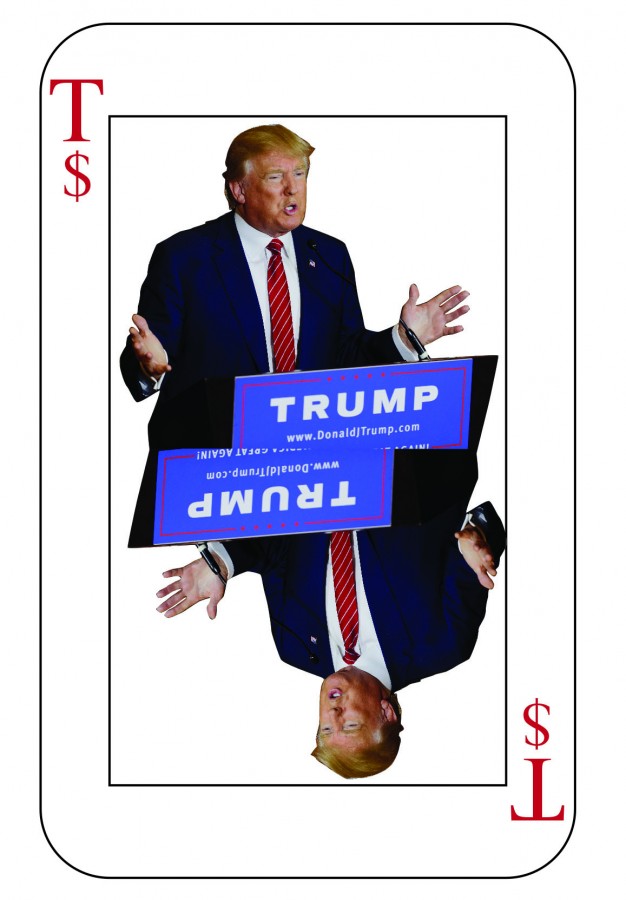Jokes aside, it’s time to take the Trump campaign seriously
Donald Trump’s campaign may have seemed trifling at first, but his anti-immigration rhetoric has started having serious consequences that need to be recognized.
When Donald Trump first announced his presidential intention in June, most people I treated it like a joke. A famously unfiltered real-estate tycoon running for president? People exchanged chuckles and quips about moving to Canada. After all, nothing came from the three previous times he considered candidacy.
Three months later, Trump leads Republican polls, but his campaign still feels like a surreal prank. He appears everywhere, from jokes about his hair on the Facebook group “Punstoppables” to a sexy Trump Halloween costume retailing for $69.95 to his face plastered on prospective t-shirt designs for the classes of 2016 and 2017. Trump transcends mere manhood to become a meme, a fiery rallying point for some, an easy-to-hate villain for others and a laughable diversion for cynical millennials.
Trump never fails to liven the political landscape with a dash of controversy. He reveals another candidate’s private phone number on live television. He implies a female pundit is on her period. And recently, he unveils his immigration plan, which includes deporting hundreds of thousands of undocumented immigrants, repealing birthright citizenship and demanding that Mexico build a wall along the U.S. border.
It is unlikely that Trump actually subscribes to his vocalized ultra-conservative beliefs; when he considered running in 2000, he stated that “I really believe the Republicans are just too crazy right,” and advocated for health care reform and gun law restrictions (albeit limited ones).
But as shaky as Trump’s resolve to his campaign platform is, his words immensely impact the groups he vilifies to incite popular fervor.
His xenophobic demagoguery resonates with a real and vocal portion of America. In August, the Boston police charged two men with assaulting a homeless Hispanic man. “Donald Trump was right, all these illegals need to be deported,” one of the men said to police afterwards.
Trump responded to the incident by saying that the people following him “love this country and want this country to be great again” before tweeting over a day later amidst backlash that he “would never condone violence.”
And yet we still treat Trump’s campaign like a joke.
Beneath our country’s saccharine all-American “melting pot” rhetoric lurks a silent but pervasive racism and fear of foreigners, one brought into stark definition by Trump’s success.
In Harker and the wider bay area, immigration is inextricably imbedded in our culture. The citizenship of our families, teachers, classmates and selves is contingent on an America that welcomes newcomers. By failing to take Trump seriously, we fail to acknowledge the threat to the open policies to which we owe our community.
Plans to build a “Great Wall of Trump” seem almost comical, but the reality remains that Trump polls as the leading GOP candidate. His uncensored comments and bombastic policies are not nearly as disturbing as the growing proportion of Americans who violently support them, perhaps more fervently than Trump himself.
Like it or not, Donald Trump is a serious candidate in the 2016 Presidential race. It is time to stop joking around.
This piece was originally published in the pages of the Winged Post on Oct. 16, 2015.

Meilan Steimle (12) is co-Editor-in-Chief of the Winged Post. She was a reporter her freshman year, Winged Post Opinion Editor her sophomore year and Winged...


















![“[Building nerf blasters] became this outlet of creativity for me that hasn't been matched by anything else. The process [of] making a build complete to your desire is such a painstakingly difficult process, but I've had to learn from [the skills needed from] soldering to proper painting. There's so many different options for everything, if you think about it, it exists. The best part is [that] if it doesn't exist, you can build it yourself," Ishaan Parate said.](https://harkeraquila.com/wp-content/uploads/2022/08/DSC_8149-900x604.jpg)




![“When I came into high school, I was ready to be a follower. But DECA was a game changer for me. It helped me overcome my fear of public speaking, and it's played such a major role in who I've become today. To be able to successfully lead a chapter of 150 students, an officer team and be one of the upperclassmen I once really admired is something I'm [really] proud of,” Anvitha Tummala ('21) said.](https://harkeraquila.com/wp-content/uploads/2021/07/Screen-Shot-2021-07-25-at-9.50.05-AM-900x594.png)







![“I think getting up in the morning and having a sense of purpose [is exciting]. I think without a certain amount of drive, life is kind of obsolete and mundane, and I think having that every single day is what makes each day unique and kind of makes life exciting,” Neymika Jain (12) said.](https://harkeraquila.com/wp-content/uploads/2017/06/Screen-Shot-2017-06-03-at-4.54.16-PM.png)








![“My slogan is ‘slow feet, don’t eat, and I’m hungry.’ You need to run fast to get where you are–you aren't going to get those championships if you aren't fast,” Angel Cervantes (12) said. “I want to do well in school on my tests and in track and win championships for my team. I live by that, [and] I can do that anywhere: in the classroom or on the field.”](https://harkeraquila.com/wp-content/uploads/2018/06/DSC5146-900x601.jpg)
![“[Volleyball has] taught me how to fall correctly, and another thing it taught is that you don’t have to be the best at something to be good at it. If you just hit the ball in a smart way, then it still scores points and you’re good at it. You could be a background player and still make a much bigger impact on the team than you would think,” Anya Gert (’20) said.](https://harkeraquila.com/wp-content/uploads/2020/06/AnnaGert_JinTuan_HoHPhotoEdited-600x900.jpeg)

![“I'm not nearly there yet, but [my confidence has] definitely been getting better since I was pretty shy and timid coming into Harker my freshman year. I know that there's a lot of people that are really confident in what they do, and I really admire them. Everyone's so driven and that has really pushed me to kind of try to find my own place in high school and be more confident,” Alyssa Huang (’20) said.](https://harkeraquila.com/wp-content/uploads/2020/06/AlyssaHuang_EmilyChen_HoHPhoto-900x749.jpeg)



